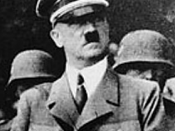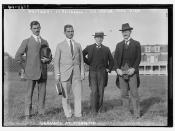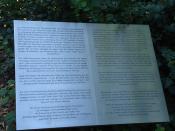It cannot be doubted that Nazi Germany was the most dominant political regimes of the 20th century, not only because it unleashed World War II or instigated the holocaust but because of its impact on German society.
From 1933 to 1935 the democratic structure of Germany was replaced with a completely centralized state. With the passing of the Enabling Law, giving Hitler and the Nazi party complete control of Germany, Hitler began eliminating all working class and liberal democratic opposition. The autonomy previously exercised in many matters by the provincial governments was eliminated, and these subnational governments were transformed into strictly controlled instruments of the central government. By a process of coordination, Gleichschaltung, all facets of political life were subjected to party control and direction. The creation of the Gestapo in 1933 would further enhance the parties power to suppress opposition to the Hitler regime.
Nazism's influence was not only within the political sector.
Germany pre-1933 exemplified the culture of modernity within its large cities, particularly Berlin. 'Expressionism', 'New Objectivity', the 'Bauhaus', films, the worker culture movement, the struggle for emancipated femininity, all provided an exciting array of cultural creativity. Hitler's 'revolution' in 1933 put an end to the many faceted pluralism of the Weimar Republic. This was now denounced as 'internationalist', 'cosmopolitan', 'Jewish', 'Negroid', or 'Bolshevist'. The Nazis' dictatorial regime set about replacing it with what it believed to be a truly Aryan, Germanic culture. With the establishment of the Reich Chamber of Culture in 1934, the Nazi Regime controlled all facets of Germanic culture, reserving the right to dismiss or ban any practice or individual from the cultural branches due to their unsuitability.
Film was a powerful tool in infiltrating German society and was part of Germany's mass change in culture. Often referred to as 'The Fuhrer's Film...



Stolen
Geez, with all the time you spent stealing various parts of this essay from various internet sites, you (maybe) could have written something of your own! Plugging different sentences from "your" essay into google reveals that many parts of this writing were directly copied from elsewhere on the web.
3 out of 3 people found this comment useful.